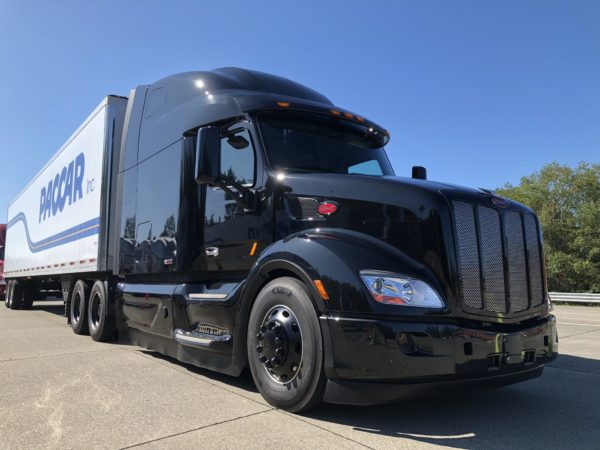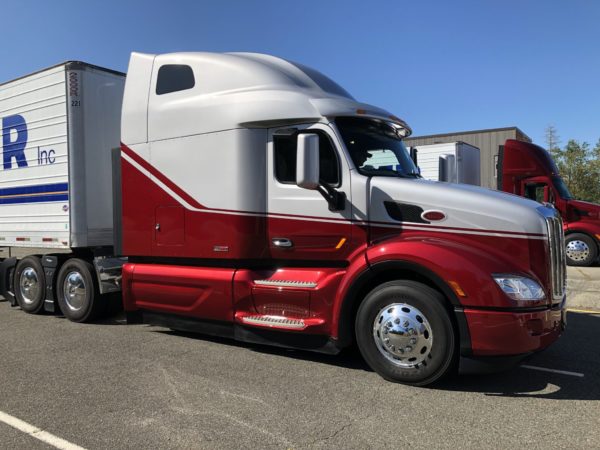Strong orders, interest in UltraLoft have Peterbilt feeling good
RENTON, Wash. – A sudden slowdown in Class 8 truck orders isn’t alarming Peterbilt, and its new UltraLoft sleeper has opened new opportunities for the truckmaker.
Those were a couple takeaways from a conversation with on-highway marketing manager Wesley Slavin, who we caught up with during a Peterbilt customer event July 24-25.

“We are still taking orders at a pretty good clip,” Slavin said. “We are selling into 2020 now. The first half of 2020 looks pretty solid. We’re not seeing anything that gets us too concerned in the first half of the year. Order intake is still strong. The backlog is holding up. We feel pretty confident going into 2020.”
Paccar is known for expertly managing the up-and-down cycles of the trucking industry. Asked how they do this, Slavin said “We are very lean. We operate very efficiently and that helps. If you get a little fat on the upswings, you have to bleed off some of that fat. We stay pretty lean typically. We have to work extra hard in an upswing to keep pace. But when the market turns, typically we are very well positioned to weather that. And having a premium product, I don’t think the market swings influence us quite as much.”
Asked how the Trump administration’s stance on tariffs will influence 2020 pricing, Slavin said “Most of our trucks are built where they’re domiciled. Our U.S.-based factories support North America, so we don’t see it impacting us to that degree.”
Peterbilt has rolled out its spacious UltraLoft sleeper, which Slavin said has been a big hit. He said it has allowed Peterbilt to hit one of its highest sleeper-to-day cab ratios in recent memory. Slavin said the idea of massive, spacious, well-appointed sleeper was inspired by the efforts fleets were making to create driver-centric facilities.
“We see what they’re doing with their driver lounges. They’re going above and beyond to make sure drivers are comfortable, not only on the road, but when they get back,” he said. “They have luxury auto-style lounges. Showers, TVs. They are putting so much effort into maintaining their driver pool and recruiting new drivers.”
Slavin said drivers’ lives on the road should be equally comfortable.
When it comes to alternative fuels, electrification is now dominating discussions with customers. Slavin said a Vancouver, B.C. fleet at the event was expressing interest in electrification. Peterbilt is electrifying its 520, 579 and 220 models. In Canada, Slavin said Peterbilt must still monitor how cold weather will affect batteries. Customers must be mindful of the electrical infrastructure requirements before leaping in.

“The viability of electric vehicles is soft,” Slavin acknowledged. “We have to get the costs down a little bit. Right now, they’re all stall-built. And then we have to get the infrastructure going. If you don’t have the right electrical infrastructure it’s not going to be viable for you.”
But he added, “We are not too far away from someone going to a Peterbilt dealership and getting an electric 220.”
Interest in natural gas has waned with lower diesel prices, but it remains viable in certain applications, such as refuse.
When it comes to fuel economy for its diesel-powered flagship Model 579, Slavin said improvements are still in the works.
“The low-hanging fruit is gone, but that doesn’t mean we’re not picking at the tree,” he said. Most further improvements will come from powertrain optimization rather than aerodynamics.
Vertical integration is another focus for Peterbilt. It now offers its own MX-13 engine and Paccar-branded automated transmission developed with Eaton. Customers are increasingly opting for the integrated powertrain, Slavin said. But he acknowledged it has horsepower and torque limitations that make it impractical for some applications. Peterbilt is working on expanding those offerings.
“As soon as we launched the Paccar transmission, every Canadian said ‘When are you going to go over 110,000 lbs?’” Slavin said. “It’s something we’ve constantly been considering. There’s a bucket of customers there that can’t do our fully integrated powertrain because they want to run at a 110,000-lb GVW.”
The secondary market has warmed to the MX-13, he said, with residual values coming in line with other offerings. This week, more than 110 customers were cycled through the Paccar Technical Center in Mount Vernon, Wash., to experience the latest Peterbilt products, including the UltraLoft sleeper.
Have your say
This is a moderated forum. Comments will no longer be published unless they are accompanied by a first and last name and a verifiable email address. (Today's Trucking will not publish or share the email address.) Profane language and content deemed to be libelous, racist, or threatening in nature will not be published under any circumstances.